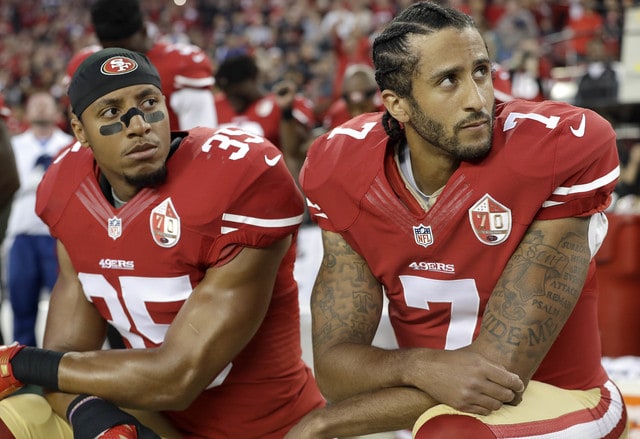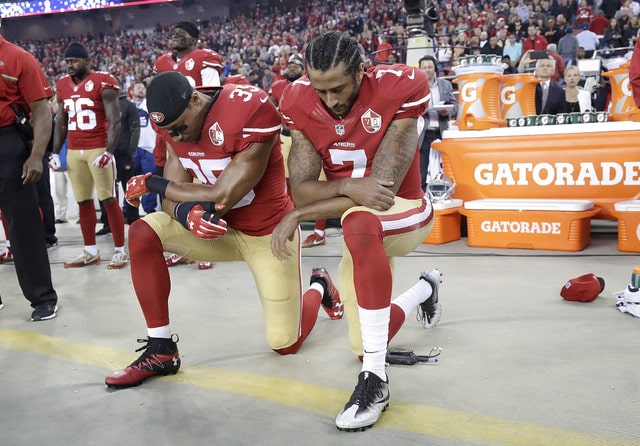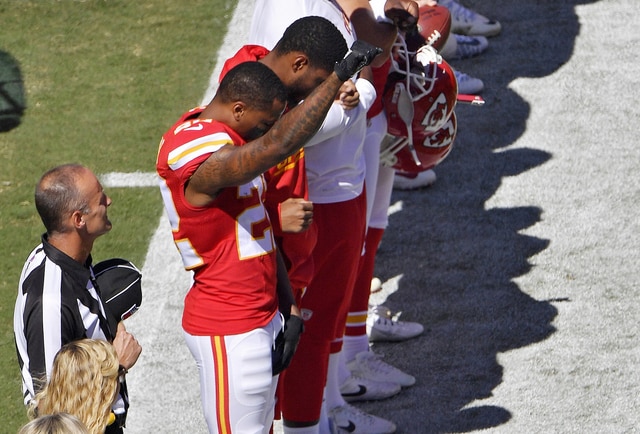


The kneeling was noticeable quickly enough. To some, the raised fists seem almost ominous.
On the first week of the NFL season there was almost as much going on during the national anthem as there was on the field. Players were making statements, and they didn’t seem afraid of disrupting the highly choreographed spectacle that is an NFL game.
At some point the league may have to find a way to deal with the newfound social consciousness of some of its employees. There’s no upside for the NFL if images of players holding clenched fists aloft during the national anthem begin to overshadow those of men colliding with each other on the field of play.
So far that hasn’t happened, though the season is young. Still, the sight of players making silent protests during the national anthem has to be disconcerting to a league that has always demanded conformity and blind obedience from its workers.
It barely qualified as an NFL issue before Colin Kaepernick took a knee during an exhibition game. Now Commissioner Roger Goodell walks a fine line, voicing support for the right of players to speak out while in the same breath saying he wants them to respect the flag and most everyone who has ever put on a uniform.
Goodell has so far been relatively restrained, and he has reason to tread lightly. The league he heads has profited greatly over the years, in no small part because it wraps itself around the flag and embraces the military and police at every opportunity.
But two-thirds of its players are black. And they — fueled by the constant feedback from social media — are finding their voice about things they see wrong in the communities they grew up in.
And sports may never be the same.
“I think we’ve come to a point in the history of sports that really for the first time in my lifetime — and I’ve spent 50 years doing this — you’re seeing athletes getting involved in social justice issues,” said Richard Lapchick, director of The Institute for Diversity and Ethics in Sport at the University of Central Florida. “You had the occasional heroic athlete stand up in the ’60s or ’70s, but they were very few and far between and they paid the price for it.”
Some may pay the price for this, too. Denver’s Brandon Marshall quickly lost two endorsements after he took a knee before last week’s opener. The outcry against Kaepernick and others on social media has been ugly at times.
And in a league where players are desperate to make rosters, it wouldn’t be a surprise if taking a stand meant a greater chance of being told to hit the road.
That wasn’t an issue when LeBron James and fellow members of the Miami Heat donned hoodies in 2012 for a team picture in support of slain Miami teen-ager Trayvon Martin. Too much star power there, and the NBA is a little more socially aware than the NFL.
Lapchick points to the hoodie protest as the start of a new generation of athletes becoming socially active. Some WNBA members also took a stand, wearing warmup shirts on behalf of Black Lives Matter this summer.
The handling of that by the WNBA was botched a bit, and surely the NFL learned lessons from that. Goodell has said all the right things so far, but it’s still early in the game.
“It’s an issue that sports is going to have to make an informed decision on how they are going to treat it,” Lapchick said. “This isn’t something that is going to go away, whether it’s in the form of the national anthem or wearing T-shirts or other paraphernalia. From my viewpoint it’s here into the indefinite future.”
That may worry some, but it pleases Lapchick to no end. He’s not only crusaded for civil rights his entire life, but paid the price for it himself.
Lapchick was a 5-year-old when he looked out his bedroom window in New York to see men hanging an image of his father. Joe Lapchick was the coach of the New York Knicks, and his crime was to sign Nat “Sweetwater” Clifton, the first black player in the NBA in 1950.
Years later, as an anti-apartheid activist, Lapchick was attacked by two men in a library at Virginia Wesleyan College, who held him down and carved the N-word into his stomach.
He’ll be watching closely as Goodell navigates his way through uncharted waters. We’ll all be watching to see how a commissioner who fancies himself to be a disciplinarian deals with things that discipline can’t solve.
The way the NFL handles anthem protests may turn out to be as significant in the long run as the protests themselves.




